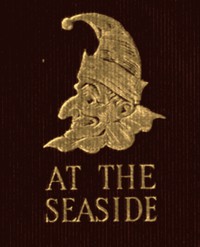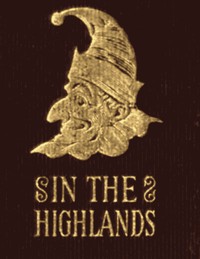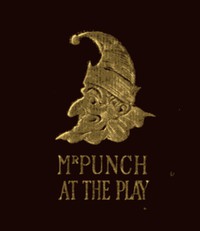Mr. Punch at the Seaside by J. A. Hammerton (classic children's novels .txt) 📗

- Author: J. A. Hammerton
Book online «Mr. Punch at the Seaside by J. A. Hammerton (classic children's novels .txt) 📗». Author J. A. Hammerton
It seems quite a pet place for Artists, I mean Sculpchers, at least I s'pose they must be Sculpchers, and that they brings their Moddels with 'em, for the Bathing Machines is stuck close to the Peer, so dreckly after breakfast the Moddels goes and bathes in the Sea, and the Sculpchers goes on the Peer, and there's nothink to divert their attention from their interesting studdys, and many on 'em passes ours there quietly meditating among the Bathing Machines.
Brown says, in his sarcastic way, it's the poor Sculpchers as comes here, who can't afford to pay for their Moddels, so they comes here and gets 'em free gratis for nothink.
There's sum werry nice walks in the nayberhood but I never walks 'em, for it seems to me that the grate joke of every Buysicler and Trysicler, and the place swarms with 'em, is to cum quietly behind you and see how close he can go by you without nocking you down. I'm sure the jumps and the starts and the frites as I had the fust day or too kep my Art in my mouth till I thort it would have choked me.
How Ladys, reel Ladys too, can expose theirselves on such things I can't make out. I herd a young Swell say that wot with them and what with the Bathing Moddels it was as good as a Burlesk!
We've got werry cumferrabel Lodgings, we have, just opposite the Gas Works and near a Brick Field. When the wind is South or West we smells the bricks and when its East we smells the Gas, but when its doo North we don't smell nuffen excep just a trifle from the Dranes, and so long as we keeps quite at the end of the werry long[Pg 168] Peer we don't smell nuffen at all excep the sea weed.
Our Landlord's a werry respeckabel man and the Stoker on our little Railway, and so werry fond of nussing our little children that they are allus as black as young Sweeps. Their gratest treat is to go with him to the Stashun and stand on the ingin when they are shuntin, so preshus little they gits of the sea breezes.
We've had a fust rate Company staying here. I've seen no less than 2 Aldermen, and 1 Warden of a City Compny, but they didn't stay long. I don't think the living was good enuff for 'em. It must be a werry trying change, from every luxery that isn't in season, to meer beef and mutton and shrimps! and those rayther course.
I think our Boatmen is about the lazyest set of fellows as ever I seed. So far from begging on you to have a soft Roe with the Tide, or a hard Roe against it, they makes all sorts of egscewses for not taking you, says they're just a going to dinner, or they thinks the wind's a gitting[Pg 170] up, or there ain't enough water!
Not enuff water in the Sea to flote a Bote! wen any one could see as there was thousands of galluns there.
I saw some on 'em this mornin bringin in sum fish, and asked the price of a pair of Souls, but they axshally said they didn't dare sell one, for every man Jack of 'em must be sent to Billingsgate! but werry likely sum on 'em might be sent back again in the arternoon, and then I could get some at the Fishmonger's!
What a nice derangemunt!
There was the butiful fresh fish reddy for eating, there was me and my family reddy to eat 'em, but no, they must be packed in boxes and carried to the Station and then sent by Rale to London, and then sent by Wan to Billingsgate, and that takes I'm told ever so many hours, and then carried back to the London Stashun, and then sent by Rale to Northgate, and then carried from the Stashun to[Pg 172] the Fishmonger's, and then I'm allowed to buy 'em!
Well if that isn't a butiful business like arrangement, my Lord Mare, I should like to know what is.
However, as I wunce herd a Deputy say, when things cums to their wust, things is sure to mend, and I don't think that things can be much wusser than that.
The Spirit of the Thing.—Landlady (to shivering lodger). No, sir, I don't object to your dining at a restorong, nor to your taking an 'apenny paper, but I must resent your constant 'abit of locking up your whiskey, thereby himplying that me, a clergyman's daughter, is prone to larceny.
[Lodger immediately hands her the key as a guarantee of good faith.
[Pg 161]
So! as it's a fine day, you'll sit on the beach and read the paper comfortably, will you? Very good! Then we recommend you to get what guinea-pigs, brandy-balls, boats, and children's socks, to say nothing of shell-workboxes, lace collars, and the like you may want, before you settle down.
[Pg 162]
"Excuse me, sir. I seem to have met you before. Are you not a relative of Mr. Dan Briggs?"
"No, madam. I am Mr. Dan Briggs himself."
"Ah, then that explains the remarkable resemblance!"
[Pg 163]
Lodger. "And then, there's that cold pheasant, Mrs. Bilkes"——
Landlady. "Yes'm, and if you should have enough without it, lor', Mr. Bilkes wouldn't mind a eatin' of it for his supper, if that's all."
[Pg 164]
Mrs. Brown. "Might I ask how much you gave that nigger?"
Mr. Brown (first day down). "Sixpence."
Mrs. B. "Oh, indeed! Perhaps, sir, you are not aware that your wife and family have listened to those same niggers for the last ten days for a penny!"
[Pg 165]
Mermaiden. "I am told you keep a circulating library?"
Librarian. "Yes, miss. There it is! Subscription, two shillings a-week; one volume at a time; change as often as you please! Would you like to see a catalogue?"
[Pg 166]
Polite Little Girl (suddenly). "This is my mamma, sir. Will you please sing her, 'It's the seasoning wot does it!'"
[Pg 167]
Visitor. "What a roaring trade the hotels will be doing, with all these holiday folk!"
Head waiter at The George. "Lor bless yer, sir, no! They all bring their nosebags with 'em!"
[Pg 169]
Wandering Minstrel. "Gurls! I'm a doocid fine cha-appie!" &c., &c.]
Wiggles and Sprott prefer bathing from the beach to having a stuffy machine. They are much pleased with the delicate little attention indicated above!
[Pg 171]
A Brighton bath-chairman's idea of a suitable route for an invalid lady
[Pg 173]
A SEASIDE ROUNDELOn the sands as loitering I stand
Where my point of view the scene commands,
I survey the prospect fair and grand
On the sands.
Niggers, half a dozen German bands,
Photographic touts, persistent, bland,
Chiromancers reading dirty hands,
Nursemaids, children, preachers, skiffs that land
Trippers with cigars of fearful brands,
Donkeys—everything, in short, but sand—
On the sands.
Old Mr. de Cramwell, being bilious and out of sorts, is ordered to go to the sea, and take plenty of exercise in the open air. (He begins at once.)
[Pg 174]
COMMON OBJECTS OF THE SEASHOREThe "disguised minstrel", believed by the public to be a peer of the realm collecting coin for a charity, but who is in reality the sentimental singer from a perambulating troop of nigger banjoists, "working on his own."
The preacher whose appreciation of the value of logic and the aspirate is on a par.
The intensely military young man whose occupation during eleven months in the year is the keeping of ledgers in a small city office.
The artist who guarantees a pleasing group of lovers for sixpence, frame included.
The band that consists of a cornet, a trombone, a clarionet, some bass, and a big drum, which is quite as effective (thanks to the trombone) when all the principals have deserted in search of coppers.[Pg 175]
And last (and commonest of all) the cockney who, after a week's experience of the discomforts of the seaside, is weary of them, and wants to go home.
A WINDY CORNER AT BRIGHTON (By an Impressionist)Old lady first, with hair like winter snows,
Makes moan.
And struggles. Then, with cheeks too richly rose,
A crone,
Gold hair, new teeth, white powder on her nose;
All bone
And skin; an "Ancient Mystery", like those
Of Hone.
Then comes a girl; sweet face that freshly glows!
Well grown.
The neat cloth gown her supple figure shows
Now thrown
In lines of beauty. Last, in graceless pose,
Half prone,
A luckless lout, caught by the blast, one knows
His tone
Means oaths; his hat, straight as fly crows,
Has flown.
I laugh at him, and—— Hi! By Jove, there goes
My own!
[Pg 176]
ON THE SANDS (A Sketch at Margate)Close under the Parade wall a large circle has been formed, consisting chiefly of Women on chairs and camp-stools, with an inner ring of small Children, who are all patiently awaiting the arrival of a troupe of Niggers. At the head of one of the flights of steps leading up to the Parade, a small and shrewish Child-nurse is endeavouring to detect and recapture a pair of prodigal younger Brothers, who have given her the slip.
Sarah (to herself). Wherever can them two plegs have got to? (Aloud; drawing a bow at a venture.) Albert! 'Enery! Come up 'ere this minnit. I see yer!
'Enery (under the steps—to Albert). I say—d'ye think she do?—'cos if——
Albert. Not she! Set tight.
[They sit tight.
Sarah (as before). 'Enery! Albert! You've bin and 'alf killed little Georgie between yer![Pg 178]
'Enery (moved, to Albert). Did you 'ear that, Bert? It wasn't me upset him—was it now?
Albert (impenitent). 'Oo cares? The Niggers'll be back direckly.
Sarah. Al-bert! 'Enery! Your father's bin down 'ere once after you. You'll ketch it!
Albert (sotto voce). Not till father ketches us, we shan't. Keep still, 'Enery—we're all right under 'ere!
Sarah (more diplomatically). 'Enery! Albert! Father's bin and left a 'ap'ny apiece for yer. Ain't yer comin' up for it? If yer don't want it, why, stay where you are, that's all!
Albert (to 'Enery). I knoo we 'adn't done nothin'. An' I'm goin' up to git that 'ap'ny, I am.
'Enery. So 'm I.
[They emerge, and ascend the steps—to be pounced upon immediately by the ingenious Sarah.
Sarah. 'Ap'ny, indeed! You won't git no[Pg 177] 'apence 'ere, I can tell yer—so jest you come along 'ome with me!
[Exeunt Albert and 'Enery, in captivity, as the Niggers enter the circle.
Bones. We shall commence this afternoon by 'olding our Grand Annual Weekly Singing Competition, for the Discouragement of Youthful Talent. Now then, which is the little gal to step out first and git a medal? (The Children giggle, but remain seated.) Not one? Now I arsk you—What is the use o' me comin'





Comments (0)